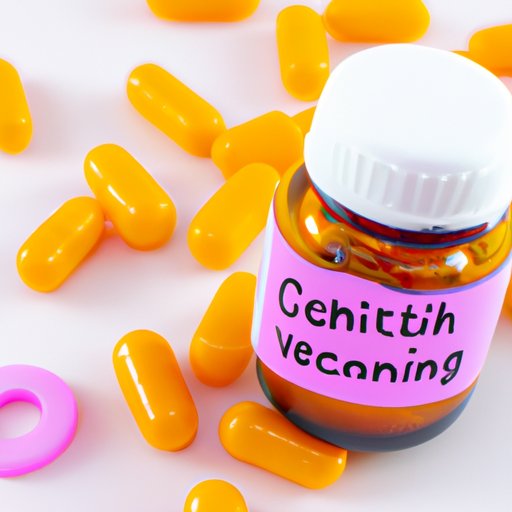
Introduction
Vitamin C is a vital nutrient that our body needs to function properly and stay healthy. This water-soluble vitamin is responsible for a variety of biological processes, such as collagen synthesis and immune system support. However, like with any nutrient, it’s important to maintain the proper balance and avoid going overboard. In this article, we’ll explore whether it’s possible to get too much vitamin C, including the benefits and risks associated with this popular nutrient.
Benefits of Vitamin C
Before we delve into the question of whether you can get too much vitamin C, let’s first discuss the many benefits of this important nutrient. For starters, vitamin C is a powerful antioxidant that helps protect our cells from damage caused by free radicals. It also plays a crucial role in collagen synthesis, which is essential for skin health and wound healing.
Moreover, vitamin C is important for maintaining a healthy immune system. It is involved in the production of white blood cells, which fight off infections and diseases. Additionally, studies have shown that vitamin C may help lower blood pressure, improve heart health, and even reduce the risk of chronic diseases like cancer and Alzheimer’s disease.
The Risk of Overdosing on Vitamin C
While vitamin C is undoubtedly beneficial for our health, it is also possible to take in too much of it. In fact, excessive vitamin C intake can lead to a condition known as vitamin C toxicity or hypervitaminosis C. This condition occurs when the body has more vitamin C than it can use or excrete.
Some of the most common symptoms of vitamin C toxicity include nausea, vomiting, diarrhea, abdominal pain, and headaches. In rare cases, it can also lead to skin rashes, kidney stones, and other long-term health problems.
How Much Vitamin C is Too Much?
The recommended daily intake of vitamin C varies depending on different factors like age and gender. For example, according to the National Institutes of Health (NIH), adult men should aim for 90 milligrams per day while adult women should aim for 75 milligrams per day.
However, it’s worth noting that these recommendations are just a general guideline. Depending on your individual health needs and lifestyle habits, you may need more or less than the recommended amount. Additionally, certain factors like smoking or pregnancy can affect how much vitamin C your body requires.
If you exceed the recommended daily intake of vitamin C, you may be putting yourself at risk for various health issues. For example, consuming large amounts of vitamin C can lead to digestive upset and other health problems in some people. Additionally, high doses of this nutrient can interfere with certain medications, such as blood thinners and chemotherapy drugs.
The Risks and Rewards of Mega-Dosing Vitamin C
While the idea of taking high doses of vitamin C may sound appealing, especially if you’re trying to fight off a cold or flu, it’s important to consider the potential risks and rewards before you start taking massive amounts of this nutrient.
On one hand, some studies have suggested that taking high doses of vitamin C may have therapeutic benefits for certain health conditions, such as cancer, heart disease, and infections. However, it’s worth noting that more research is needed to fully understand these potential benefits and to determine what a safe level of mega-dosing would be.
On the other hand, taking high doses of vitamin C can also come with some potential downsides. For example, it can cause digestive upset and other symptoms. Additionally, some experts warn that over-reliance on vitamin C supplements can create an unhealthy obsession with wellness and undermine your overall health goals.
If you’re considering mega-dosing on vitamin C, it’s important to talk to your doctor first. They can help you determine the right dosage for your individual needs and health status.
Vitamin C Overdose: What You Need to Know
If you’re concerned that you may have taken too much vitamin C, it’s important to be aware of the common symptoms of vitamin C overdose. These can include digestive upset, headaches, fatigue, and kidney stones.
If you suspect that you’ve overdosed on vitamin C, it’s important to seek medical attention right away. Depending on the severity of your symptoms, your doctor may recommend treatment options like intravenous fluids or medications to help manage digestive upset.
Finally, if you’re looking to avoid accidentally overdosing on vitamin C, it’s important to be mindful of your diet and supplement routine. Aim to get vitamin C from whole food sources like citrus fruits, bell peppers, and leafy greens whenever possible, and talk to your healthcare provider before starting any new supplement regimen.
Conclusion
Vitamin C is an essential nutrient that provides a wide range of health benefits. However, it’s also important to maintain a healthy balance and avoid excessive intake. By understanding the risks and rewards of vitamin C intake, you can make informed decisions about your diet and supplement regimen and stay on track towards optimal health. If you have any concerns about your vitamin C levels, be sure to consult your healthcare provider for guidance.




